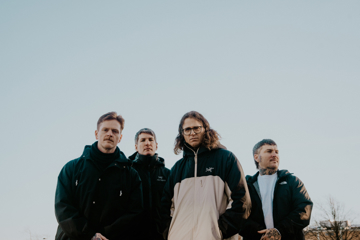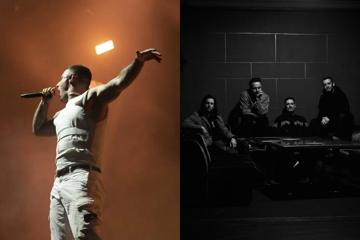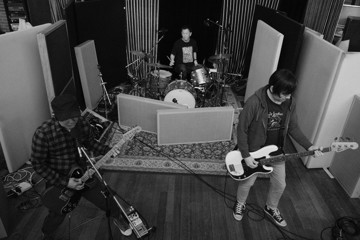Here's Why 'Venom' Is Marvel's Most Mediocre & Meaningless Film Yet
"Is it possible that this movie — this oh-so-mediocre, very meaningless movie — marks a greater cultural moment of collective superhero-flick fatigue?"
VENOM

Do I really want to keep doing this with my life? This is a thought your friend and humble narrator Film Carew had during Venom, a movie so mediocre that it may cause existential quandaries for all who sink two hours into watching it. There’s been worse comic book movies of recent — Suicide Squad, especially — but none have seemed to have so little reason to exist as Venom. Which is funny (or, perhaps, deeply sad), given that some bean-countin’ suits out there have, seriously, imagined this entirely-disposable, very-lame popcorn-movie fluff as laying the bedrock for a thing actually with-a-straight-face called Sony’s Marvel Universe.
It’s an anti-hero movie, essentially, with Tom Hardy really leaning into an embarrassing, very-dated ‘cool dude’ archetype: a leather-jacket-wearing, motorcycle-riding, hard-drinking, tattooed middle-aged man. Early in the film, he takes a meeting with his editor, who says, “There isn’t a better investigative reporter working today,” because empty superlatives like this are a great expository shorthand to introducing a character. He’s such a capital-j Journalist that, when given a puff-piece interview with Riz Ahmed’s tech-bro villain —a Musky visionary sending rockets into space, genetic testing on human guinea-pigs, presiding over a high-tech laboratory fortress that apparently doesn’t have CCTV, playing God, etc.— Hardy tries to turn it into a hard-hitting exposé.
Daring to bite the hand that feeds, he swiftly hits that generic rock bottom of opening acts eternal: he loses his job, his girlfriend (Michelle Williams, invariably under-utilised), his apartment. And, so, this man-who-lost-everything is a perfect empty-vessel for the arrival of an alien ‘symbiote’, a parasitic life-form that takes hold of a human host to survive in the local environment.
This means: more animated, slithering, menacing goo than you saw in Life (the faux-Alien one, not the James Dean-themed one), with alien-lifeforms hopping into unaware human hosts, then murdering people with an evil glint in their eye. Sometimes these alien interlopers play things covert, hiding inside humans and passing discreetly through customs, other times they turn into ridiculous, grinning, Lovecraftian monsters. In Hardy’s case, there’s the amusing comic-book trope where he goes from fully-clothed man to alien monster back to dude in that same somehow-unsullied outfit; transformations of CGI magic and not much logic.
Don't miss a beat with our FREE daily newsletter
Venom essentially ends out playing as a not-particularly-funny buddy-cop movie, where Tom Hardy and the menacing alien voice inside his head swap ball-bustin’ bro-banter. Apparently, it doesn’t take an alien lifeform long in its stay on Earth to know that saying, “Pussy,” when your human host doesn’t want to jump out a window is totally hilarious for the 12-year-old boys in this film’s intended audience.
Though Venom tries to play as comedy, rarely is it actually funny. Between the jokes, there’s endless ‘cool’ killings and barrages of automatic weapon fire, yet another San-Francisco car chase where vehicles get airborne driving over those bumpy hills, and yet another direly unfunny Stan Lee cameo.
And, of course, it ends, as so many superhero films now must, with the hero fighting a nega version of themselves: Hardy-as-alien-monster taking on Ahmed-as-alien-monster. As the CGI alien goo slithers and swirls and shapeshifts, the two creatures literally bleed into another, to the point where you can’t recognise who is who. This is perfectly symbolic of yet another climactic comic-book movie fight hatcheted up with such horrible editing that it becomes incoherent, a barrage of images that makes no visual sense, achieves no tension, and makes you impatient for the resolution.
And, of course, after the resolution (and after a credit-song by Eminem, for fuck’s sake) comes the obligatory mid-credits ‘teaser’ setting up some kind of hoped-for sequel or spin-off that only catastrophic box-office failure can halt from imminent production. It’s highly unlikely Venom fails so badly as to stop whatever array of Marvel-adjacent entertainment-products Sony is already factoring into spreadsheets. But, is it possible that this movie — this oh-so-mediocre, very meaningless movie — marks a greater cultural moment of collective superhero-flick fatigue? Or is it just me?
HOLD THE DARK

Watching Hold The Dark, you’re left to ponder a bunch of questions. Like: wait, is that the end? Why did all those people shoot all those other people? Do all films set in Alaska involve people dying in the inhospitable environs? Is Riley Keough’s character really possessed by a wolf demon? Is Alexander ‘dramatic range of a very-handsome plank of wood’ Skarsgård the worst big-name actor in Hollywood? And, most pressingly, is this really how Jeremy Saulnier chose to follow up his punks-vs-skins survival-horror classic Green Room?
Saulnier’s breakout film, Blue Ruin, took the familiar action-thriller set-up and unpacked, and undermined, its tropes; becoming less a celebration of ultraviolent revenge, more a critical reappraisal of stock clichés. It introduced the world to his leading-man and recurring collaborator, Macon Blair, whose own directorial debut, I Don’t Feel At Home In This World Anymore, was an even-more-comic critique of the limits, and idiocy, of vengeance.
There is, sadly, none of those critical smarts applied to Hold The Dark; a film Blair wrote and appears in. Its hook is simple: Keough is a grieving mother who invites wolfpack-expert Jeffrey Wright to a village in frontier Alaska so remote they only just got power and plumbing. She wants him to hunt down the wolves who killed her son; a pretty great premise for the director whose last film involved throat-ripping attack-dogs.
Only, then she disappears. In her place is Skarsgård, who we meet stabbing a fellow Yankee soldier in Iraq, then watch kill lots and lots of people for seemingly no apparent reason. And here in the wilds of Alaska, other people act the same: everyone has a gun, and is going to turn it on anyone who looks at ’em sideways; the film’s centrepiece is an endless shootout in which one lone, glowering man’s-man unloads endless bullets upon an inept police-force.
I guess all this All-American, gun-toting makes Hold The Dark a ‘Western’, with Skarsgård — inexpressive, monotone, forever frowning; bringing back painful Mute memories — some kind of Eastwoodian figure, a hard man in a hard landscape. The whole film carries itself with his curious lack of emotional range: it’s so grave, stern, and broodingly macho as to seem stilted. It presents gun-wielding dick-movie clichés, stirs in some exotifying mysticism, and leaves off with an interpretative ending that adds a faux existential air to what’s been, prior, a deeply dopey film.







